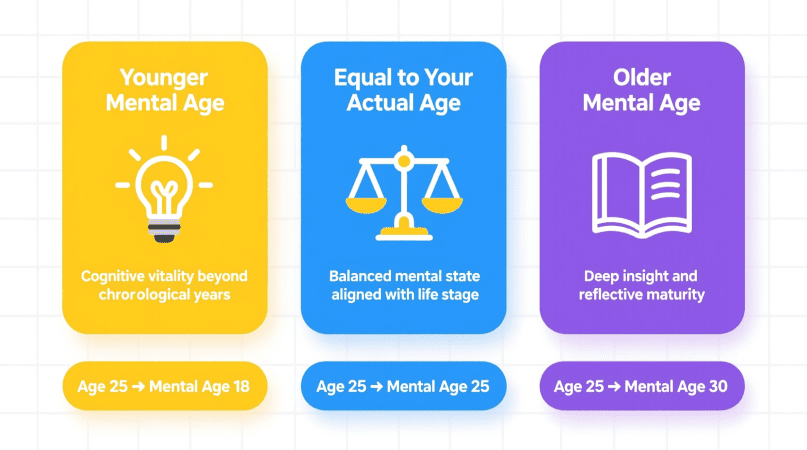
Taking a mental age test is fun, but the score can leave you wondering what it really means. Your result doesn’t measure intelligence—it shows how your mindset, maturity, and outlook align with typical age groups. Here’s how to read those results and apply them to everyday life.
What It Means If Your Mental Age Is Lower Than Your Real Age
- Traits: Curious, playful, spontaneous, adaptable.
- Example: A 40-year-old with a mental age of 25 may love exploring new ideas, embrace technology quickly, and stay lighthearted.
- Takeaway: A younger mental age highlights creativity and openness. Just balance it with responsibility when needed.
Learn exactly how our mental age test works and what your score really means.
What It Means If Your Mental Age Matches Your Real Age
- Traits: Balanced, consistent, grounded in your current stage of life.
- Example: A 30-year-old with a mental age of 30 likely shares common attitudes, habits, and decision-making styles with peers.
- Takeaway: Matching ages suggests strong alignment between who you are and where you are in life.
Explore the difference between mental age and maturity to understand your results better.
What It Means If Your Mental Age Is Higher Than Your Real Age
- Traits: Responsible, thoughtful, mature, steady under pressure.
- Example: A 20-year-old scoring a mental age of 35 may be described as “wise beyond their years” and take on leadership roles early.
- Takeaway: A higher mental age points to maturity and foresight, but be mindful not to miss out on playfulness and exploration.
Quick Reference: Mental vs Real Age
| Result Type | What It Suggests | Example Scenario |
|---|---|---|
| Lower Mental Age | Playful, curious, adaptable | A 50-year-old who feels like 30 |
| Equal to Real Age | Balanced, steady, age-aligned | A 25-year-old who scores 25 |
| Higher Mental Age | Mature, wise, cautious | A teenager who thinks like a 30-year-old |
Discover ways to improve your mental age after taking the test.
How to Use Your Results
- Self-reflection: Ask if the result matches how you see yourself.
- Embrace strengths: Younger results can fuel creativity; older results can guide wise decision-making.
- Seek balance: If you lean too far one way, consider adding playfulness or responsibility into your routine.
Explore the connection between intelligence and maturity in is mental age the same as IQ
FAQs
1. What does a lower mental age mean?
It means you think and act more playfully and openly than your real age might suggest.
2. What if my mental age matches my real age?
It indicates you’re in sync with typical expectations for your life stage.
3. What does a higher mental age say about me?
It points to maturity, responsibility, and a thoughtful approach to life.
4. Can mental age change?
Yes. Experiences, stress, learning, and growth all shape your mental age over time.
5. Does mental age measure intelligence?
No. It reflects mindset and personality, not IQ or cognitive ability.
- You should always consider how accurate these quizzes are before making major life changes based on the score.
- The primary goal is often to highlight the gap between mental and real age clearly.
- Your final score can explain how you act in daily life compared to your peers.
- It is useful to distinguish this result from your intellectual age to get the full picture of your mind.
- If you need to verify your current status, you can easily check it online again to compare results.
- Understanding the importance of this assessment will help you value the feedback provided.
- Knowing how the test measures maturity helps you analyze the final number with better context.